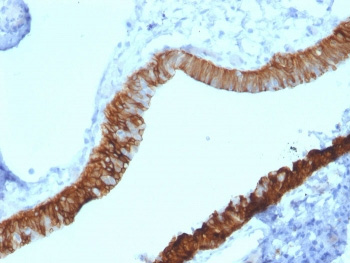- Tel: 858.663.9055
 Email: info@nsjbio.com
Email: info@nsjbio.com
- Tel: 858.663.9055
- Email: info@nsjbio.com
KRT3 Antibody detects keratin 3, a type II intermediate filament protein expressed primarily in the corneal epithelium. Together with keratin 12, KRT3 forms a structural network that maintains corneal transparency, resilience, and barrier function. This keratin pairing is essential for the integrity of the ocular surface, protecting the cornea against mechanical stress, pathogens, and environmental insults.
Mutations in KRT3 cause Meesmann corneal dystrophy, a rare genetic disorder marked by epithelial fragility, microcysts, and vision impairment. Because of this, the KRT3 Antibody is not only a powerful marker of corneal identity but also a valuable tool for studying corneal disease and keratinopathies. Keratin 3 expression is restricted to the corneal epithelium, making it highly specific compared with other keratins expressed in stratified epithelia.
For researchers in ophthalmology, regenerative medicine, and genetic disease, Keratin 3 Antibody reagents are indispensable.
NSJ Bioreagents provides KRT3 Antibodies validated for immunohistochemistry, immunofluorescence, western blotting, and ELISA. Each KRT3 Antibody undergoes rigorous validation for specificity to keratin 3, ensuring minimal cross-reactivity with other corneal or epithelial keratins.
By selecting a KRT3 Antibody from NSJ Bioreagents, scientists gain reagents optimized for reproducibility. Our antibodies produce sharp, reliable staining in corneal epithelium, consistent protein detection in western blotting, and strong signals in imaging assays. With detailed datasheets, recommended controls, and optimized protocols, NSJ Bioreagents ensures that Keratin 3 Antibody products deliver accuracy and confidence for both discovery and translational research.
The KRT3 Antibody has wide-ranging applications in ophthalmology, pathology, and regenerative science.
KRT3 Antibodies identify corneal epithelial cells in tissue and culture.
The KRT3 Antibody helps clarify corneal differentiation and stratification.
Keratin 3 Antibody reagents support studies of corneal wound healing.
Mutations in KRT3 cause Meesmann corneal dystrophy, making KRT3 Antibodies essential for research.
The KRT3 Antibody detects mutation effects in patient samples and transgenic models.
Keratin 3 Antibody tools support biomarker discovery for genetic eye disorders.
KRT3 Antibodies confirm corneal origin in pathology samples.
The KRT3 Antibody helps differentiate corneal epithelium from conjunctival tissue.
Keratin 3 Antibody reagents are applied in biopsy studies to assess corneal disease.
KRT3 Antibodies validate stem cell-derived corneal epithelial differentiation.
The KRT3 Antibody supports tissue engineering of corneal grafts.
Keratin 3 Antibody reagents ensure correct lineage commitment in regenerative protocols.
KRT3 Antibodies help identify keratin expression patterns in ocular surface neoplasms.
The KRT3 Antibody is applied to distinguish tumor types in ophthalmic pathology.
KRT3 Antibodies are used in preclinical models to evaluate therapies for corneal dystrophies.
The KRT3 Antibody validates biomarkers of corneal regeneration in clinical studies.
Keratin 3 Antibody tools support therapeutic testing for ocular wound healing and repair.
Keratin 3 is a definitive marker of corneal epithelium with roles in structural stability and disease. The KRT3 Antibody provides precise detection of this keratin, while Keratin 3 Antibody reagents more broadly support research in ophthalmology, genetics, regenerative medicine, and translational science.
In basic biology, KRT3 Antibodies highlight corneal differentiation and integrity. In disease research, the KRT3 Antibody clarifies the molecular basis of Meesmann corneal dystrophy. In clinical applications, Keratin 3 Antibody products confirm tissue identity and validate therapeutic strategies.
Clinically, KRT3 markers are emerging as diagnostic and prognostic tools in corneal pathology. By ensuring accurate detection of this protein, the KRT3 Antibody links molecular biology with ophthalmic care, advancing precision approaches in eye research and therapy.
Keratin 3 is a specialized corneal marker critical for epithelial structure, genetic disease research, and regenerative therapy. The KRT3 Antibody equips scientists and clinicians with a reliable tool for detecting keratin 3, while Keratin 3 Antibody reagents more broadly support advances in corneal biology, ophthalmology, and translational medicine. By connecting fundamental insights with clinical applications, these antibodies remain indispensable for advancing vision science and improving patient outcomes.

IHC staining of FFPE human ovary tissue with KRT3 antibody (clone KRT3/2130).